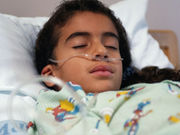No significant benefit in survival with favorable functional outcome at one year for comatose children
WEDNESDAY, Jan. 25, 2017 (HealthDay News) — Therapeutic hypothermia is not associated with significant benefit in survival with favorable functional outcome among comatose children who survive in-hospital cardiac arrest, according to a study published online Jan. 24 in the New England Journal of Medicine. The research was published to coincide with the annual Society of Critical Medicine’s Critical Care Congress, held from Jan 21 to 25, Honolulu.
Frank Moler, M.D., from the University of Michigan Health System in Ann Arbor, and colleagues conducted a trial at 37 children’s hospitals to compare two temperature interventions in children with in-hospital cardiac arrest. Comatose children older than 48 hours and younger than 18 years were randomized to therapeutic hypothermia or therapeutic normothermia.
After randomization of 329 patients, the trial was terminated because of futility. Among the 257 patients with a Vineland Adaptive Behavior Scales, second edition (VABS-II) score of at least 70 before cardiac arrest and who could be evaluated, the researchers observed no significant difference between the hypothermia and normothermia groups in terms of the primary efficacy outcome (survival at 12 months after cardiac arrest with a score of 70 or higher on the VABS-II) (36 versus 39 percent, respectively; relative risk, 0.92; 95 percent confidence interval, 0.67 to 1.27; P = 0.63).
“Among comatose children who survived in-hospital cardiac arrest, therapeutic hypothermia, as compared with therapeutic normothermia, did not confer a significant benefit in survival with a favorable functional outcome at one year,” the authors write.
Copyright © 2017 HealthDay. All rights reserved.








